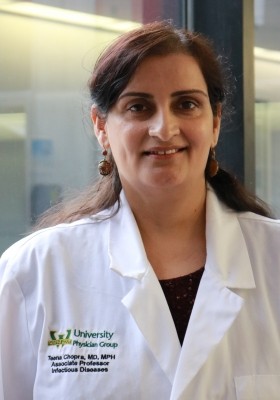What Effect Will Holiday Travel Have On The Pandemic? from NPR
December 29, 2020
Please don’t travel. That was the advice many public health officials urged Americans to follow this holiday pandemic season. And yet, travel over Christmas surged as millions of people left their homes and cities to spend it with family. All the while, hospitals are overflowing, still dealing with a surge of infections from travel over the Thanksgiving holiday. Dr. Teena Chopra is an infectious disease specialist at Wayne State University School of Medicine in Detroit, Mich.
Welcome to the program.
TEENA CHOPRA: Thank you, Sarah. Thank you for having me.
MCCAMMON: Well, as we know, hospitals are overflowing right now with cases of infections from the Thanksgiving travel surge, and now we’re looking at a surge on top of a surge. So, if you would, put this in perspective for us. What kinds of numbers are we looking at in the early part of the new year, and how bad are these numbers compared to where we’ve been so far?
CHOPRA: Sure. This is definitely a very worrisome and terrifying situation to see such a huge number of people traveling. You know, more than 7.1 million people traveled in the last week alone, and we are not even there at new year. And remember, all of these people are going to come back. They’re going to return home, and that means more travel. And then there’s new year. So whenever there is mass gatherings and mass travel, that is a fuel for the virus, and it intensifies these hospitalizations and deaths.
MCCAMMON: We’ve been hearing this message for months now – please don’t go anywhere. And yet lots of people still do. We have this conversation after each major holiday with someone, it seems like. As a health care professional, what do you make of that?
CHOPRA: Yeah, I think there is a huge amount of fatigue – pandemic fatigue, and mental health is suffering in general in the community. People don’t adapt easily to change, and they find ways to make excuses and see their loved ones when they know that seeing their mom or grandmom (ph) who is at higher risk can also lead to their hospitalization or even death. The travels are less than last year in Christmas, but they are enough to cause huge surge on a surge, like you mentioned.
MCCAMMON: And do we have a sense of who’s actually traveling? I mean, are these people who don’t believe – don’t accept the science that COVID-19 is a serious problem or is it a broader range of people?
CHOPRA: I think they are both kinds. I think they’re nonbelievers and they are believers who have convinced themselves somehow that it is worth it. And that is a bigger problem.
MCCAMMON: How much of the infection surge is actually from travel versus just regular mask-less gatherings? I mean, can we tease out what’s driving this?
CHOPRA: I think we can tease out data from individual states and see what is driving in states that still don’t have those strict restrictions, like in-room dining and gathering in churches and mass gatherings. Like I said, wherever there is mass gatherings, that’s going to lead on to surge. Michigan, for example, has these restrictions in place, and we are beginning to see downward trends because we don’t – our cases were being driven by outbreaks from restaurants, from bars, from temples and churches. And all of those have gone down. So that tells us that any time we can restrict mass gatherings in any form, we will see a downward trend in our surges.
MCCAMMON: Since a lot of people clearly are traveling, is it possible to travel safely? I mean, are there certain behaviors that are worse than others?
CHOPRA: Sure. You know, not masking, being very close to each other and traveling when you are sick, you have fever or you’ve been exposed to someone – all those are very, very high-risk behaviors. Keep in mind that we now have a new strain, and that new strain is even more worrisome because it can transmit easily. And there is a high chance that we already have that strain in the U.S., and that even makes it worse.
MCCAMMON: Dr. Chopra, the pandemic will still be with us for a number of months now. Even though we know the vaccines are rolling out, this is not over yet. Is there anything about the message itself or the tone of the messaging that needs to change in order to finally convince people not to travel around these major holidays?
CHOPRA: Sure. I think the message should be the fact that science has given us so much in these last several months and the progress that the scientists have made – the fact that health care workers are on the front lines fighting for the safety of our community. And they also have families, and they also have holidays, but they are sacrificing all of this and taking care of patients. So the fact that we are so close to the finish line – we need to believe in science, and we need to believe in all these scientists who have worked so hard over the last year. This is our way of practicing gratitude to all of them.
MCCAMMON: Dr. Teena Chopra is an infectious disease specialist at Wayne State University School of Medicine.
Listen to “What Effect Will Holiday Travel Have On The Pandemic?” from NPR.
Learn more about Teena Chopra, M.D., M.P.H.
